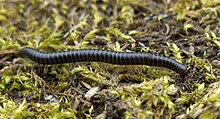Julida is an order of millipedes. Members are mostly small and cylindrical, typically ranging from 10–120 millimetres (0.39–4.72 in) in length.[1] Eyes may be present or absent, and in mature males of many species, the first pair of legs is modified into hook-like structures.[2] Additionally, both pairs of legs on the 7th body segment of males are modified into gonopods.[3]
| Julida | |
|---|---|

| |
| Tachypodoiulus niger (Julidae) | |
| Scientific classification | |
| Domain: | Eukaryota |
| Kingdom: | Animalia |
| Phylum: | Arthropoda |
| Subphylum: | Myriapoda |
| Class: | Diplopoda |
| Superorder: | Juliformia |
| Order: | Julida Brandt, 1833 |
| Superfamilies | |
| |
| Synonyms | |
|
Zygocheta Cook, 1895 | |

Distribution
editJulida contains predominantly temperate species ranging from North America to Panama, Europe, Asia north of the Himalayas, Asir region, Saudi Arabia, and Southeast Asia.[4]
Classification
editThe order Julida contains approximately 750 species, divided into the following superfamilies and families:[5]
- Blaniuloidea C. L. Koch, 1847
- Blaniulidae C. L. Koch, 1847
- Galliobatidae Brolemann, 1921
- Okeanobatidae Verhoeff, 1942
- Zosteractinidae Loomis, 1943
- Juloidea Leach, 1814
- Julidae Leach, 1814
- Rhopaloiulidae Attems, 1926
- Trichoblaniulidae Verhoeff, 1911
- Trichonemasomatidae Enghoff, 1991
- Nemasomatoidea Bollman, 1893
- Chelojulidae Enghoff, 1991
- Nemasomatidae Bollman, 1893
- Pseudonemasomatidae Enghoff, 1991
- Telsonemasomatidae Enghoff, 1991
- Paeromopodoidea Cook, 1895
- Aprosphylosomatidae Hoffman, 1961
- Paeromopodidae Cook, 1895
- Parajuloidea Bollman, 1893
- Mongoliulidae Pocock, 1903
- Parajulidae Bollman, 1893
References
edit- ^ "Diagnostic features of Millipede Orders" (PDF). Milli-PEET Identification Tables. The Field Museum, Chicago. Archived from the original (PDF) on 30 November 2020. Retrieved 25 October 2013.
- ^ J. Gordon Blower (1985). Millipedes: Keys and Notes for the Identification of the Species. Synopses of the British Fauna. Linnean Society of London. ISBN 978-90-04-07698-3.
- ^ Shelley, Rowland M. (1999). "Centipedes and Millipedes with Emphasis on North American Fauna". The Kansas School Naturalist. 45 (3): 1–16. Archived from the original on 2016-11-12. Retrieved 2014-03-18.
- ^ "Geographic distribution of Millipede Families" (PDF). Milli-PEET Identification Tables. The Field Museum, Chicago. Archived from the original (PDF) on 30 November 2020. Retrieved 25 October 2013.
- ^ William Shear. "Class Diplopoda de Blainville in Gervais, 1844" (PDF). In Z.-Q. Zhang (ed.). Animal biodiversity: an outline of higher-level classification and survey of taxonomic richness. Vol. 159–164. p. 3148.
{{cite book}}:|journal=ignored (help)
Ilic, B. (2019). Multifaceted activity of millipede secretions:. [online] Web of Science. Available at: http://apps.webofknowledge.com/full_record.do?product=WOS&search_mode=GeneralSearch&qid=1&SID=6AJXsNVdjIGRrwQybhF&page=1&doc=4 [Accessed 18 Oct. 2019].
External links
edit- Media related to Julida at Wikimedia Commons
- Data related to Julida at Wikispecies
- "Julida". The Encyclopedia of Life.